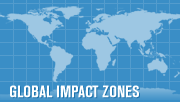Risk of Disease Rises With Water Temperatures
The Washington Post outlines scientists' predictions that the risk of disease outbreaks and epidemics will rise along with water temperatures.
- Warmer temperatures mean heavier rainfall, triggering sewage overflows that contaminate drinking water and endanger beachgoers.
- Warmer temperatures in lakes and oceans will cause large blooms of disease-causing bacteria, parasites, and algae.
- Warmer weather will lead to more mosquitoes, increasing the incidence and spread of West Nile Virus, malaria, and dengue fever.
- Consequences will be especially severe in 950 US towns with 'combined sewer systems' - including New York City, Washington DC, Milwaukee, and Philadelphia, as overflowing sewage spills into lakes and waterways.
- One of the strongest predictions that come out of climate models is intense rain.
Risk of Disease Rises with Water Temperatures
The Washington Post
By Kari Lydersen
October 20, 2008
Page A08
When a 1991 cholera outbreak that killed thousands in Peru was traced to plankton blooms fueled by warmer-than-usual coastal waters, linking disease outbreaks to epidemics was a new idea.
Now, scientists say, it is a near-certainty that global warming will drive significant increases in waterborne diseases around the world.
Rainfalls will be heavier, triggering sewage overflows, contaminating drinking water and endangering beachgoers. Higher lake and ocean temperatures will cause bacteria, parasites and algal blooms to flourish. Warmer weather and heavier rains also will mean more mosquitoes, which can carry the West Nile virus, malaria and dengue fever. Fresh produce and shellfish are more likely to become contaminated.
Heavier rainfalls are one of the most agreed-upon effects of climate change. The frequency of intense rainfalls has increased notably in the Midwest, the Northeast and Alaska, and the trend will accelerate, said the 2007 report of the United Nations' Intergovernmental Panel on Climate Change.
For the rest of this article, please CLICK HERE.



